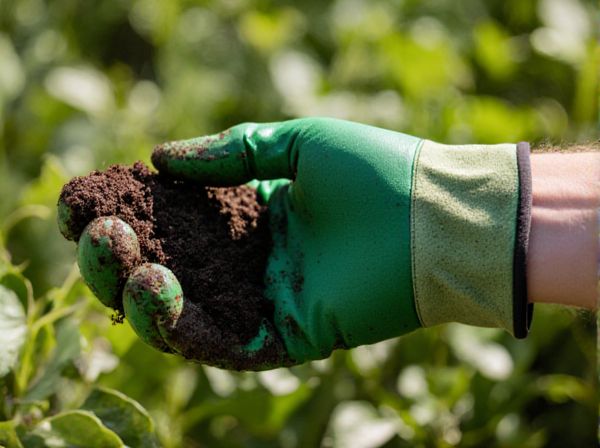
Green manure vs Synthetic nitrogen Illustration
Green manure enriches soil naturally by adding organic matter and enhancing microbial activity, improving soil structure and fertility without chemical residues. Synthetic nitrogen provides immediate nutrient availability but can lead to soil degradation, water pollution, and greenhouse gas emissions over time. Choosing green manure supports sustainable agriculture by promoting long-term soil health and reducing environmental impact.
Table of Comparison
| Criteria | Green Manure | Synthetic Nitrogen |
|---|---|---|
| Source | Natural plant material (legumes, cover crops) | Industrial chemical compounds (ammonium nitrate, urea) |
| Nitrogen Release | Slow, gradual nutrient release improving soil health | Fast, immediate nitrogen availability for crops |
| Soil Impact | Enhances organic matter and microbial activity | May degrade soil structure and reduce biodiversity |
| Environmental Effects | Reduces runoff and greenhouse gas emissions | Can cause water pollution and increased emissions |
| Cost | Low with on-farm production | Higher input costs, dependent on manufacturing |
| Suitability | Ideal for organic farming and sustainable agriculture | Common in conventional, high-yield systems |
Understanding Green Manure: Definition and Benefits
Green manure refers to specific cover crops grown primarily to improve soil fertility and structure by adding organic matter and nutrients, particularly nitrogen, through natural nitrogen fixation. Unlike synthetic nitrogen fertilizers, green manure enhances soil biodiversity, promotes microbial activity, and reduces chemical runoff and greenhouse gas emissions. Incorporating green manure crops such as clover, vetch, or alfalfa into organic farming systems supports sustainable nutrient cycling and long-term soil health.
What Is Synthetic Nitrogen Fertilizer?
Synthetic nitrogen fertilizer is a chemically manufactured nutrient source designed to provide essential nitrogen to crops, enhancing plant growth and yield. Unlike organic green manure, which enriches soil naturally through decomposed plant material, synthetic nitrogen delivers nitrogen in readily available forms like ammonium nitrate or urea. Its high solubility and rapid action make it a widely used option in conventional agriculture but raise concerns about environmental impact and soil health over time.
Soil Health: Green Manure vs Synthetic Nitrogen
Green manure enhances soil health by increasing organic matter, improving microbial activity, and boosting nutrient availability through natural nitrogen fixation. Synthetic nitrogen provides an immediate nutrient supply but can disrupt soil microbial balance and lead to long-term soil degradation. Consistent use of green manure promotes sustainable soil fertility and reduces dependency on chemical inputs.
Environmental Impact of Green Manure and Synthetic Fertilizers
Green manure improves soil health by increasing organic matter, enhancing microbial activity, and reducing erosion, leading to long-term sustainability and carbon sequestration. Synthetic nitrogen fertilizers contribute to greenhouse gas emissions, including nitrous oxide, and cause water pollution through runoff, resulting in eutrophication of aquatic ecosystems. Using green manure reduces dependency on chemical inputs and supports biodiversity, making it a more environmentally friendly choice for crop production.
Nutrient Release and Availability: A Comparative Overview
Green manure enhances nutrient release gradually by decomposing organic matter, improving soil structure and microbial activity, which ensures a sustained supply of nitrogen over time. Synthetic nitrogen delivers nutrients rapidly and in precise amounts, resulting in immediate nutrient availability but with a higher risk of leaching and volatile losses. The balance between these sources determines nutrient efficiency and long-term soil fertility in organic farming systems.
Effects on Soil Microbial Life
Green manure enhances soil microbial life by increasing organic matter and providing diverse nutrients, leading to richer microbial diversity and activity. Synthetic nitrogen fertilizers often disrupt microbial balance, reducing beneficial microbes and altering soil enzyme functions. Long-term use of green manure supports sustainable soil health by fostering microbial ecosystems, while synthetic nitrogen can degrade soil microbial habitats.
Long-term Productivity: Organic vs Synthetic Approaches
Green manure enhances long-term soil productivity by improving soil structure, increasing microbial activity, and providing a slow release of essential nutrients. Synthetic nitrogen fertilizers offer immediate nutrient availability but can lead to soil degradation and reduced fertility over time due to lack of organic matter replenishment. Consistent use of green manure supports sustainable soil health and resilience, promoting higher yields in organic farming systems.
Application Methods: Green Manure vs Synthetic Nitrogen
Green manure application involves incorporating cover crops like legumes directly into the soil to naturally enhance nitrogen content and improve soil structure. Synthetic nitrogen is typically applied through foliar sprays, soil injections, or granular fertilizers, allowing precise nutrient delivery tailored to crop growth stages. While green manure boosts long-term soil fertility and biodiversity, synthetic nitrogen offers rapid nutrient availability and ease of application for immediate crop needs.
Cost-effectiveness in Organic Gardening
Green manure offers a cost-effective alternative to synthetic nitrogen by improving soil fertility naturally without recurring purchase expenses. Unlike synthetic nitrogen fertilizers, which can be costly and subject to price volatility, green manure reduces dependence on external inputs by enhancing soil nutrient cycles and organic matter content. This sustainable method supports long-term soil health and lowers overall input costs in organic gardening systems.
Choosing the Right Nitrogen Source for Your Garden
Green manure improves soil fertility naturally by fixing atmospheric nitrogen and enhancing microbial activity, making it an ideal choice for sustainable gardening. Synthetic nitrogen fertilizers provide quick, concentrated nitrogen but can cause soil degradation and require careful management to prevent runoff and environmental damage. Selecting the right nitrogen source depends on your garden's soil health, crop needs, and long-term sustainability goals.
Green manure vs Synthetic nitrogen Infographic

 gardendif.com
gardendif.com